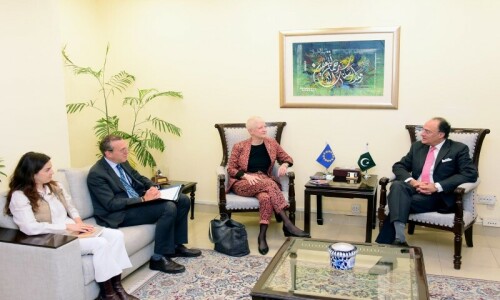
ISLAMABAD: The scenes at Dharmarajika Stupa evoked awe and reverence as a group of monks recited hymns in the ‘Pali’ language as they performed rituals at one of the holiest sites of Buddhism.
After attending the session on the second day of the Gandhara Symposium, the religious scholars, archaeologists and senior monks visited the Taxila Museum and the Dharmarajika Stupa. They also offered rituals in front of tooth relics of Lord Buddha at the museum.
Earlier in the day, the speakers at the symposium called upon the government of Pakistan for setting up enabling environment to invite Buddhist pilgrims to the country in large numbers.
As he spoke about the belief system of Buddhism, Prof Dr Hridya Ratna from Nepal highlighted that Gautam Buddha is considered as a “teacher and a guide –but not a God”.
He added that meditation and Ayurveda medicinal system were introduced by the Buddhists and developed during the Gandhara period. Dr Ratna even demonstrated a meditation style involving the whole audience who sat in silence with their eyes closed for one minute.
Speakers urge govt to create enabling environment for religious tourism
“Many things and knowledge are beyond religion as they are all related to humans,” he added.
Prof Ruth Young, professor of archaeology at the University of Leicester in the UK, highlighted that around 35,000 visitors came to see the artefacts and relics of Gandhara civilisation when they were exhibited in Zurich, Switzerland.
“This shows that not only the Buddhist people but a large number of people from other regions wanted to seek knowledge about this ancient civilisation,” Prof Young said.
She added that Pakistan should engage the local communities and devise mechanisms so that they too benefit from flourishing tourism to Gandhara.
“But I want to add that tourism is not always beneficial, they bring in indisciplined people who damage sensitive sites, create pollution and even overstress the local environment,” Prof Young added.
The speakers called for improving logistic and lodging issues and promoting Gandhara to the outside world. While one of the speakers even suggested that “security management in Pakistan has to be camouflaged and not so open as it gives a fearful impression” of the country.
Yi Yun Jung, a senior researcher at a cultural heritage foundation in South Korea highlighted the role of Korea in the conservation and preservation of the Gandhara sites. She highlighted that training was imparted to the officials of relevant departments and university students that included site investigation, analysis, monument condition, the study of the master plan, organisation of the site, the size of the structures, taking photos and drone imagery.
She added that the final assessments were made with the help of modern technology to avoid damage to the artefacts of ancient civilisation.
Other speakers included Prof Xiang Debao from Beijing University and Nishantha Pushpakumara from Sri Lanka
In a talk with reporters, Dr Ramesh Kumar Vankwani, chairman of the PM’s Task Force on Gandhara Tourism, said the ‘Taxila declaration’ on reviving the Gandhara civilisation and Buddhist heritage in Pakistan would be implemented after consultation with the chief monks of various Buddhist countries.
Talking to reporters, Ambassador of Thailand Chakkrid Krachaiwon termed the symposium a landmark step by the government, hoping that this would give a boost to religious tourism and fetch Buddhist scholars from across the world.
Venerable Dr Kallanchiye Rathanasiri, Department of Buddhist Studies at Bhiksu University of Sri Lanka, said, “As a Buddhist place, we will highly encourage our followers of Buddhism to come to Pakistan and visit Taxila from where they can get vast knowledge about the mix of cultures.” — Our Correspondent in Taxila also contributed to this report
Published in Dawn, July 13th, 2023













































